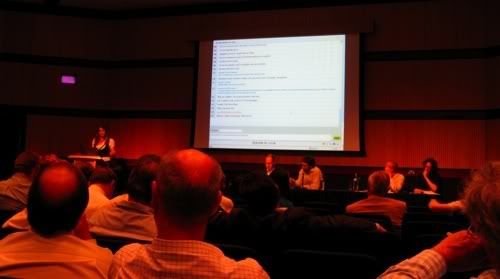The Big Debate - More Power or More Powerless?

Yesterday I attended The Big Debate at the ICC. As one of the bloggers for the NGA Festival, this came within my remit so I was there, laptop at the ready. I’ve also been helping to flesh out the Birmingham Post’s coverage of this particular event (out of the goodness of my heart).
I’ve already posted up my notes I took at the event itself but here’s a bit of personal reaction. Please bear in mind that I’ve compiled a round-up of what many more cleverer people than I have said so I’ll be addressing the points they haven’t made.
First, I have two main criticisms of the debate:
- The topic was far too wide, so discussion ended up being spread thinly over too many topics
- The panel managed to be narrow yet too diverse. Everyone was pro-digital but everyone came from different industries with little crossover. Where were the privacy campaigners? The ID theft victims? At least a nay-saying dinosaur/music industry rep would’ve added some flavour.
Other than that it was fine. I’ve not always been a fan of the debate format. Talking shops often wind me up, not helped when any debate is between people in entrenched positions. I prefer the ebb and flow of persuasive discourse to two people banging their heads together. At the end of a discussion I like to having the impression that things have progressed a little but maybe that’s my corporate side showing.
Anyway, I didn’t come out feeling like any problems had been solved because I thought so much had gone undiscussed. On the other hand it was good to hear from some people doing some interesting things in their fields (even if I’m still not exactly sure what it is Doug Williams does).
There was some complaint that those watching online weren’t being addressed. Well, there are many reasons why that would be the case. The live feed and blogging was only set up at the last minute by the enterprising (and not to mention supposedly on annual leave) panelist Joanna Geary – essentially it was a (hopefully useful) afterthought. Secondly, and following on, Rory Cellan-Jones was unaware and unprepared for this when he arrived. Thirdly, the people in the hall had taken time out of their (working) day to attend and, to my mind, should be afforded attention as a courtesy. I could go on. In an ideal world more online chat might have been incorporated, but this is no ideal world.
That said, it was a question from the live blog that caused some head-scratching on the panel. ‘Can each panelist give one example of ‘digital’ that has made us powerless?’. Of course there are plenty of examples (privacy concerns, identity theft, those being left out of the digital uptake and those on the end of ‘cyber-bullying’ spring to my mind) but debating this sort of thing would’ve been interesting.
Finally, there was only one downright stupid comment (that I can recall) and that came from an audience member who started off making an interesting point but insisted on carrying on talking. Essentially he argued that there’s more value in bands performing live than putting their music on MySpace. What the smoking ban had to do with it, I’m not sure. Anyway, he developed his point by saying that many bands came from scenes – punk in the 70s, Madchester in the early 90s, etc.
Of course there are many scenes that have flourished online and this point was made by the panel. As an example, I used to contribute to the mash-up/bootleg/bastard pop scene (the subject of an inevitable later post) which thrives online because it’s supported by an international community who struggle to find a critical mass of support for their music locally.
Oh, and I met D’Log, which was a pleasure. Unfortunately I’d cycled over in a hurry in blazing sunshine and had to excuse myself while I went and stuck my head under a tap.